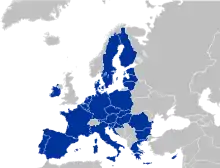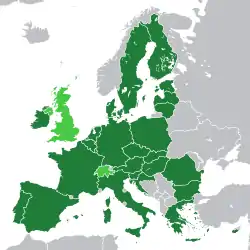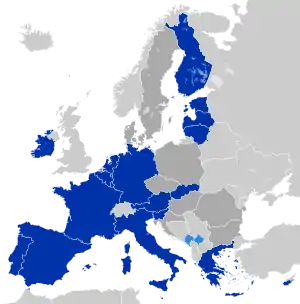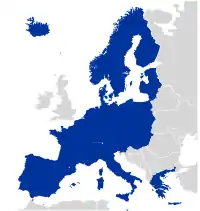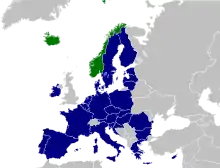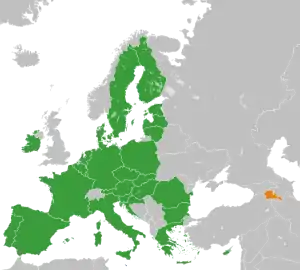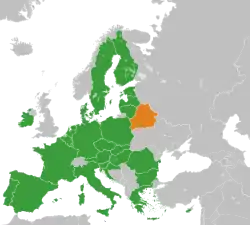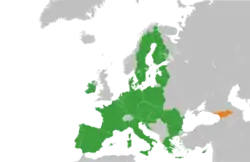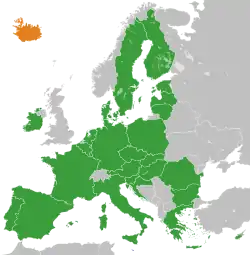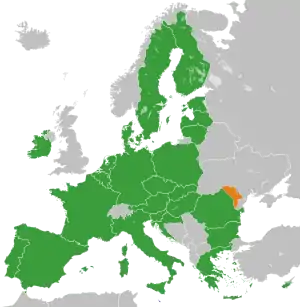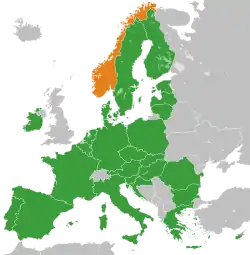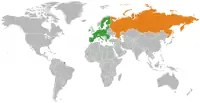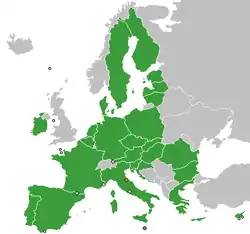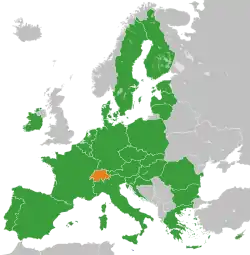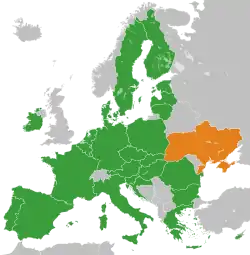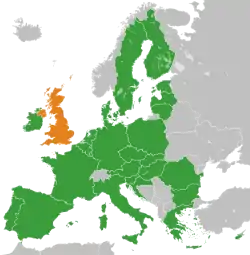Potential enlargement of the European Union
There are five recognised candidates for membership of the European Union: Turkey (applied in 1987), North Macedonia (applied in 2004), Montenegro (applied in 2008), Albania (applied in 2009), and Serbia (applied in 2009). All have started accession negotiations.[1] Kosovo, whose independence is not recognised by five EU member states,[2] and Bosnia and Herzegovina are recognised as potential candidates for membership by the EU. Bosnia and Herzegovina has formally submitted an application for membership, while Kosovo has a Stabilisation and Association Agreement (SAA) with the EU, which generally precedes the lodging of a membership application. Montenegro and Serbia, the most advanced candidates, are both expected to join no earlier than 2022, with 2025 being more likely.[3] While the others are progressing, Turkish talks are at an effective standstill.[4]
 |
|---|
| This article is part of a series on the politics and government of the European Union |
|
|
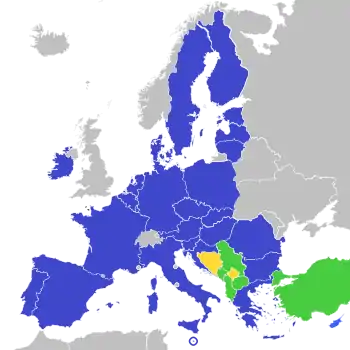
The accession criteria are included in the Copenhagen criteria, agreed in 1993, and the Treaty of Maastricht (Article 49). Article 49 of the Maastricht Treaty (as amended) says that any "European state" that respects the "principles of liberty, democracy, respect for human rights and fundamental freedoms, and the rule of law", may apply to join the EU. Whether a country is European or not is subject to political assessment by the EU institutions.[5]
Past enlargement since the foundation of the European Union (EU) as the European Economic Community by the Inner Six states in 1958[6] brought total membership of the EU to twenty-eight, although as a result of the withdrawal of the United Kingdom, the current number of EU member states is twenty-seven.
Of the four major western European countries that are not EU members, Iceland, Norway, and Switzerland have submitted membership applications in the past but subsequently frozen them, while the United Kingdom is a former member. Liechtenstein, Norway, Switzerland and Iceland participate in the EU Single Market and also participate in the Schengen Area, which makes them closely aligned with the EU; none however are in the EU Customs Union. In 2014, the EU signed Association Agreements with Georgia, Moldova, and Ukraine,[7] and the European Parliament passed a resolution recognising the "European perspective" of all three countries.[8]
Current agenda
The present enlargement agenda of the European Union regards Turkey and the Western Balkan states of Albania, Bosnia and Herzegovina, Kosovo, North Macedonia, Montenegro, and Serbia. These states must negotiate the terms of their EU accession with the current member states, and align their domestic legislation with EU law before joining.
Turkey has a long-standing application with the EU, but their accession negotiations have stalled since 2016.[9] This is due to the political issues surrounding the accession of the country.[10] As for the Western Balkan states, the EU had pledged to include them after their civil wars: in fact, two states have entered (Slovenia in 2004 and Croatia in 2013), four are candidates, and the remaining two have pre-accession agreements.[11]
There are other states in Europe that either seek membership or could potentially apply, if their present foreign policy changes or the EU gives a signal that they might now be included on the enlargement agenda. However, these are not formally part of the current agenda, which is already delayed due to bilateral disputes in the Balkans and difficulty in fully implementing the acquis communautaire (the accepted body of EU law).
In 2005, the European Commission suggested in a strategy paper that the present enlargement agenda could potentially block the possibility of a future accession of Armenia, Azerbaijan, Belarus, Georgia, Moldova, and Ukraine.[12] Olli Rehn, the European Commissioner for Enlargement between 2004 and 2010, said on occasion that the EU should "avoid overstretching our capacity, and instead consolidate our enlargement agenda," adding, "this is already a challenging agenda for our accession process."[13]
It was previously the norm for enlargements to see multiple entrants join the Union at once. The only previous enlargements of a single state were the 1981 admission of Greece and the 2013 admission of Croatia.
However, the EU members have warned that, following the significant impact of the fifth enlargement in 2004, a more individual approach will be adopted in the future, although the entry of pairs or small groups of countries will most probably coincide.[14]
Western Balkans
The 2003 European Council summit in Thessaloniki set integration of the Western Balkans as a priority of EU expansion. This commitment was made in order to stabilise the region in the wake of the Yugoslav Wars, a series of ethnic wars through the 1990s that led to the breakup of Yugoslavia.
Slovenia, the first former Yugoslav country to obtain independence, joined the EU in 2004, followed by Croatia in 2013.
Albania, Serbia, North Macedonia, and Montenegro are all candidate states, and all of them are in negotiations.[15] Bosnia and Herzegovina has applied to join but is not yet recognised as a candidate while Kosovo, which declared independence in 2008, is not recognised by all EU states or by Serbia.
Serbia and Montenegro could join the European Union in 2025.[16] The European Council endorsed starting negotiations with North Macedonia and Albania on 26 March 2020, and they could join after 2025.[17]
Bulgaria blocked North Macedonia's EU Accession Negotiations.[18]
Turkey
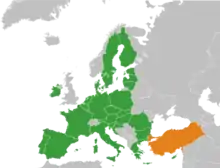
Turkey's candidacy to join the EU has been a matter of major significance and considerable controversy since it was granted in 1999. Turkey has had historically close ties with the EU, having an association agreement since 1964,[19] being in a customs union with the EU since 1995 and initially applying to join in 1987. Only after a summit in Brussels on 17 December 2004 (following the major 2004 enlargement), the European Council announced that membership negotiations with Turkey were officially opened on 3 October 2005.
Turkey is the thirteenth largest economy in the world, and is a key regional power.[20][21] In 2006, Carl Bildt, Swedish foreign minister, stated that "[The accession of Turkey] would give the EU a decisive role for stability in the Eastern part of the Mediterranean and the Black Sea, which is clearly in the strategic interest of Europe."[22]
However, others, such as former French President Nicolas Sarkozy and German Chancellor Angela Merkel, maintain opposition to Turkey's membership. Opponents argue that Turkey does not respect the key principles that are expected in a liberal democracy, such as the freedom of expression.[23] Turkey's large population would also alter the balance of power in the representative European institutions. Upon joining the EU, Turkey's 84 million inhabitants would bestow it the largest number of MEPs in the European Parliament.[24] It would become the most populous country in the EU. Another problem is that Turkey does not recognise one EU state, Cyprus, because of the Cyprus dispute and the Cypriot government blocks some chapters of Turkey's talks.
Turkey's relations with the EU have seriously deteriorated in the aftermath of the 2016 Turkish coup d'état attempt and subsequent purges.[25][26] On 24 November 2016, the European Parliament approved a non-binding resolution calling for the "temporary freeze of the ongoing accession negotiations with Turkey" over human rights and rule of law concerns.[27][28][29] On 13 December, the European Council (comprising the heads of state or government of the member states) resolved that it would open no new areas in Turkey's membership talks in the "prevailing circumstances",[30] as Turkey's path toward autocratic rule made progress on EU accession impossible.[31] As of 2017, and especially following Erdoğan's victory in the constitutional referendum, Turkish accession talks are effectively at a standstill.[4][32][33]
Summary table
| State | Status | Association Agreement |
Membership Application |
Candidate status |
Negotiations start |
Screening completed |
Chapters [N 1][34] |
Obstacles | |
|---|---|---|---|---|---|---|---|---|---|
| Albania | Candidate negotiating |
1 April 2009 (SAA) | 28 April 2009 | 24 June 2014[1] | 26 March 2020[35][36] | – | – |
Corruption, organised crime, politicisation of the judiciary.[37] | |
| Bosnia and Herzegovina |
Applicant | 1 June 2015 (SAA) | 15 February 2016[38] | – | – | – | – |
Constitution needs significant reform, little federal agreement about the future of the state.[37] | |
| Kosovo (status disputed) |
Potential candidate |
1 April 2016 (SAA)[39] | – | – | – | – | – |
Still under an EU rule-of-law assistance mission, deep political and corruption problems, status is disputed.[37] | |
| Montenegro | Candidate negotiating |
1 May 2010 (SAA) | 15 December 2008 | 17 December 2010 | 29 June 2012 | 27 June 2013 | 3/33 of 33 |
Work on bringing financial and budgetary provisions in line with the acquis is still at an early stage.[40] | |
| North Macedonia | Candidate negotiating |
1 April 2004 (SAA) | 22 March 2004 | 17 December 2005 | 26 March 2020[35][36] | – | – |
Disputes with Bulgaria, concerns about democracy and rule of law.[37][18] | |
| Serbia | Candidate negotiating |
1 September 2013 (SAA) | 22 December 2009 | 1 March 2012 | 21 January 2014[41] | 24 March 2015 | 2/18 of 34 |
Ongoing dispute over Kosovo, little progress in fighting corruption.[37] | |
| Turkey | Candidate negotiating |
1 December 1964 (AA) |
14 April 1987 | 12 December 1999 | 3 October 2005 | 13 October 2006 | 1/16 of 33 | The Cyprus dispute, among other issues. Planned Turkish policies may violate the Copenhagen criteria of eligibility for membership. Human rights abuses have become a serious problem.[42] 14 chapters have had negotiations frozen since the late 2000s.[43] A 2018 EU statement indicates that there will be no further chapters opened in the foreseeable future.[44] |
- Excluding Chapters 34 (Institutions) and 35 (Other Issues) since these are not legislation chapters.
Status
| Recognised candidate countries[45] | Potential candidate countries[45] | Reference member states | ||||||||||||||
|---|---|---|---|---|---|---|---|---|---|---|---|---|---|---|---|---|
Event |
Turkey[46] | North Macedonia[47] | Montenegro[48] | Serbia[49] | Albania[50] | Bosnia and Herzegovina[51] |
Kosovo[52][Note 1] | Finland | Czech Republic |
Bulgaria | Croatia | |||||
| EU Association Agreement[Note 2] negotiations start | 1959AA 1970CU |
5 Apr 2000 | 10 Oct 2005[Note 3] | 10 Oct 2005[Note 4] | 31 Jan 2003 | 25 Nov 2005 | 28 Oct 2013[54] | 1990 | 1990 | 1990 | 24 Nov 2000 | |||||
| EU Association Agreement signature | 12 Sep 1963AA 1995CU |
9 Apr 2001 | 15 Oct 2007 | 29 Apr 2008 | 12 Jun 2006 | 16 Jun 2008 | 27 Oct 2015[55] | 2 May 1992 | 4 Oct 1993 | 8 Mar 1993 | 29 Oct 2001 | |||||
| EU Association Agreement entry into force | 1 Dec 1964AA 31 Dec 1995CU[56] |
1 Apr 2004 | 1 May 2010 | 1 Sep 2013 | 1 Apr 2009 | 1 Jun 2015[57] | 1 Apr 2016[58] | 1 Jan 1994 | 1 Feb 1995 | 1 Feb 1995 | 1 Feb 2005 | |||||
| Membership application submitted | 14 Apr 1987 | 22 Mar 2004 | 15 Dec 2008 | 22 Dec 2009 | 28 Apr 2009 | 15 Feb 2016[59] | (tbd) | 18 Mar 1992 | 17 Jan 1996 | 14 Dec 1995 | 21 Feb 2003 | |||||
| Council asks Commission for opinion | 27 Apr 1987 | 17 May 2004 | 23 Apr 2009 | 25 Oct 2010[60] | 16 Nov 2009 | 20 Sep 2016[61] | (tbd) | 6 Apr 1992 | 29 Jun 1996 | 29 Jan 1996 | 14 Apr 2003 | |||||
| Commission presents legislative questionnaire to applicant | 1 Oct 2004 | 22 Jul 2009 | 24 Nov 2010 | 16 Dec 2009 | 9 Dec 2016[62] | (tbd) | Mar 1996 | Apr 1996 | 10 Jul 2003 | |||||||
| Applicant responds to questionnaire | 10 May 2005 | 12 Apr 2010 | 22 Apr 2011 | 11 Jun 2010 | 28 Feb 2018 | (tbd) | Jun 1997 | 25 Apr 1997 | 9 Oct 2003 | |||||||
| Commission prepares its opinion (and subsequent reports) | 1989, 1997–2004 | 2005–2009 | 9 Nov 2010 | 12 Oct 2011 | 2010-2013 | 29 May 2019 | (tbd) | 4 Nov 1992 | 15 Jul 1997 | 1997–99 | 20 Apr 2004 | |||||
| Commission recommends granting of candidate status | 13 Oct 1999 | 9 Nov 2005 | 9 Nov 2010 | 12 Oct 2011 | 16 Oct 2013[63] | (tbd) | (tbd) | 4 Nov 1992 | 15 Jul 1997 | 15 Jul 1997 | 20 Apr 2004 | |||||
| Council grants candidate status to Applicant | 12 Dec 1999 | 17 Dec 2005 | 17 Dec 2010[64] | 1 Mar 2012 | 27 Jun 2014[65][66] | (tbd) | (tbd) | 21 Dec 1992 | 12 Dec 1997 | 12 Dec 1997 | 18 Jun 2004 | |||||
| Commission recommends starting of negotiations | 6 Oct 2004 | 14 Oct 2009 | 12 Oct 2011 | 22 Apr 2013[67] | 9 Nov 2016[68] | (tbd) | (tbd) | 4 Nov 1992 | 15 Jul 1997 | 13 Oct 1999 | 6 Oct 2004 | |||||
| Council sets negotiations start date | 17 Dec 2004 | 18 Jun 2019[69] | 26 Jun 2012[70] | 17 Dec 2013[71] | 26 Jun 2018[72][73][69] | (tbd) | (tbd) | 21 Dec 1992 | 12 Dec 1997 | 10 Dec 1999 | 2004, 2005 | |||||
| Membership negotiations start | 3 Oct 2005 | 26 Mar 2020[35][36] | 29 Jun 2012 | 21 Jan 2014[74] | 26 Mar 2020[35][36] | (tbd) | (tbd) | 1 Feb 1993 | 31 Mar 1998 | 15 Feb 2000 | 3 Oct 2005 | |||||
| Membership negotiations end | (tbd) | (tbd) | (tbd) | (tbd) | (tbd) | (tbd) | (tbd) | 1994 | 13 Dec 2002 | 17 Dec 2004 | 30 Jun 2011 | |||||
| Accession Treaty signature | (tbd) | (tbd) | (tbd) | (tbd) | (tbd) | (tbd) | (tbd) | 24 Jun 1994 | 16 Apr 2003 | 25 Apr 2005 | 9 Dec 2011 | |||||
| EU joining date | (tbd) | (tbd) | (tbd) | (tbd) | (tbd) | (tbd) | (tbd) | 1 Jan 1995 | 1 May 2004 | 1 Jan 2007 | 1 Jul 2013 | |||||
| Acquis chapter | Turkey | North Macedonia | Montenegro | Serbia | Albania | Bosnia and Herzegovina |
Kosovo | Finland | Czech Republic |
Bulgaria | Croatia | |||||
| 1. Free Movement of Goods | f | s | o | fs | s | – | x | x | x | x | ||||||
| 2. Freedom of Movement for Workers | f | s | o | fs | s | – | x | x | x | x | ||||||
| 3. Right of Establishment & Freedom to provide Services | f | s | o | fs | s | – | x | x | x | x | ||||||
| 4. Free Movement of Capital | o | s | o | fs | s | – | x | x | x | x | ||||||
| 5. Public Procurement | fs | s | o | o | s | – | x | x | x | x | ||||||
| 6. Company Law | o | – | o | o | s | – | x | x | x | x | ||||||
| 7. Intellectual Property Law | o | s | o | o | s | – | x | x | x | x | ||||||
| 8. Competition Policy | fs | – | o | fs | s | – | x | x | x | x | ||||||
| 9. Financial Services | f | – | o | o | s | – | x | x | x | x | ||||||
| 10. Information Society & Media | o | – | o | fs | s | – | x | x | x | x | ||||||
| 11. Agriculture & Rural Development | f | – | o | fs | s | – | x | x | x | x | ||||||
| 12. Food safety, Veterinary & Phytosanitary Policy | o | s | o | fs | s | – | x | x | x | x | ||||||
| 13. Fisheries | f | – | o | o | s | – | x | x | x | x | ||||||
| 14. Transport Policy | f | – | o | fs | s | – | x | x | x | x | ||||||
| 15. Energy | f | – | o | fs | s | – | x | x | x | x | ||||||
| 16. Taxation | o | – | o | fs | s | – | x | x | x | x | ||||||
| 17. Economic & Monetary Policy | o | s | o | o | s | – | x | x | x | x | ||||||
| 18. Statistics | o | s | o | o | s | – | x | x | x | x | ||||||
| 19. Social Policy & Employment | fs[Note 5] | – | o | fs | s | – | x | x | x | x | ||||||
| 20. Enterprise & Industrial Policy | o | s | o | o | s | – | x | x | x | x | ||||||
| 21. Trans-European Networks | o | – | o | fs | s | – | x | x | x | x | ||||||
| 22. Regional Policy & Coordination of Structural Instruments | o | s | o | fs | s | – | x | x | x | x | ||||||
| 23. Judiciary & Fundamental Rights | f | s | o | o | s | – | x | x | x | x | ||||||
| 24. Justice, Freedom & Security | f | s | o | o | s | – | x | x | x | x | ||||||
| 25. Science & Research | x | s | x | x | s | – | x | x | x | x | ||||||
| 26. Education & Culture | f | s | x | x | s | – | x | x | x | x | ||||||
| 27. Environment | o | – | o | fs | s | – | x | x | x | x | ||||||
| 28. Consumer & Health Protection | o | – | o | fs | s | – | x | x | x | x | ||||||
| 29. Customs Union | f | – | o | o | s | – | x | x | x | x | ||||||
| 30. External Relations | f | – | x | o | s | – | x | x | x | x | ||||||
| 31. Foreign, Security & Defence Policy | f | – | o | fs | s | – | x | x | x | x | ||||||
| 32. Financial Control | o | s | o | o | s | – | x | x | x | x | ||||||
| 33. Financial & Budgetary Provisions | o | – | o | o | s | – | x | x | x | x | ||||||
| 34. Institutions | f | – | – | – | – | – | x | x | x | x | ||||||
| 35. Other Issues | – | – | – | o | – | – | x | x | x | x | ||||||
| Situation of policy area at the start of membership negotiations (Turkey, reference states), at candidate status recommendation (North Macedonia, Montenegro, Serbia) or membership application opinion (Albania, Bosnia and Herzegovina); according to the 1992 Opinion, 1997 Opinions, 1999 Reports, 2005 Reports, 2010 Opinion, 2010 Reports, 2011 Reports and the 2019 Bosnia and Herzegovina Analytical Report. | ||
|
s – screening of the chapter |
generally already applies the acquis
no major difficulties expected
further efforts needed
non-acquis chapter - nothing to adopt |
considerable efforts needed
very hard to adopt
situation totally incompatible with EU acquis
|
Notes
- Kosovo is the subject of a territorial dispute between the Republic of Kosovo and the Republic of Serbia. The Republic of Kosovo unilaterally declared independence on 17 February 2008. Serbia continues to claim it as part of its own sovereign territory. The two governments began to normalise relations in 2013, as part of the 2013 Brussels Agreement. Kosovo is currently recognized as an independent state by 98 out of the 193 United Nations member states. In total, 113 UN member states recognized Kosovo at some point, of which 15 later withdrew their recognition. The European Union remains divided on its policy towards Kosovo, with five EU member states not recognizing its independence.
- EU Association Agreement type: Stabilisation and Association Agreement (SAA) for the Western Balkans states participating in the Stabilisation and Association process of the EU (Albania, Bosnia and Herzegovina, North Macedonia, Montenegro, Serbia and Kosovo through the STM); Association Agreement and Customs Union for Turkey; European Economic Area (EEA) for Iceland and Finland (reference state of the Fourth Enlargement); Europe Agreement for the reference states of the Fifth Enlargement.
- Montenegro started negotiations in November 2005 while a part of Serbia and Montenegro. Separate technical negotiations were conducted regarding issues of sub-state organizational competency. A mandate for direct negotiations with Montenegro was established in July 2006. Direct negotiations were initiated on 26 September 2006 and concluded on 1 December 2006.[53]
- Serbia started negotiations in November 2005 while part of Serbia and Montenegro, with a modified mandate from July 2006.
- Including anti-discrimination and equal opportunities for men and women.
States not on the agenda
The Maastricht Treaty (Article 49) states that any European country (as defined by a European Council assessment) that is committed to democracy may apply for membership in the European Union.[75] In addition to European states, other countries have also been speculated or proposed as future members of the EU.
States in Western Europe who have chosen, for various reasons, not to become full members of the EU have integrated with it to different extents according to their circumstances. Iceland, Norway, and Liechtenstein participate directly in the single market via the European Economic Area, Switzerland does so via bilateral treaties and the other European microstates (Andorra, Monaco, San Marino, Vatican City) have specific agreements with the EU and neighbouring countries, including their use of the euro as their currency. Most of these countries are also part of the Schengen Area. While this integration is designed as a substitute for full membership, there are ongoing debates in a number of these countries as to whether they should join as full members. Three (Norway, Iceland, and Switzerland) have all previously had live applications to join the EU which have been withdrawn or otherwise frozen. Such applications could be resubmitted in the event of a change in the political landscape.
Georgia, Moldova, and Ukraine ratified an Association Agreement with the EU and the European Parliament passed a resolution in 2014 stating that "in accordance with Article 49 of the Treaty on European Union, Georgia, Moldova and Ukraine, as well as any other European country, have a European perspective and can apply for EU membership in compliance with the principles of democracy, respect for fundamental freedoms and human rights, minority rights and ensuring the rule of rights."[76] They also entered the Deep and Comprehensive Free Trade Area with the EU, which creates "framework for modernising [...] trade relations and for economic development by the opening of markets via the progressive removal of customs tariffs and quotas, and by an extensive harmonisation of laws, norms and regulations in various trade-related sectors, creating the conditions for aligning key sectors" of their economies with EU standards.[77] However, the EU did not expand further into the post-Soviet space in the 2010s.[78]
As of January 2021, Georgia is preparing to formally apply for EU membership in 2024.[79][80]
- Azerbaijan and Kazakhstan are transcontinental states. These countries are not on the agenda of the EU to be members, nor their own. See: Azerbaijan–European Union relations and Kazakhstan–European Union relations.
- Cape Verde and Israel are non-European countries with close historical and political relations with the EU. See: Cape Verde–European Union relations and Israel–European Union relations.
- Australia and Canada are non-European countries with values, culture, trade and politics closely linked with European ones. The membership of both countries has been proposed due to this. See: Australia–European Union relations and Canada–European Union relations.
Internal enlargement
Internal enlargement is the process of new member states arising from the break-up of or secession from an existing member state.[138][139][140] There have been and are a number of active separatist movements within member states (for example in Catalonia and Flanders) but there are no clear agreements, treaties or precedents covering the scenario of an existing EU member state breaking into two or more states, both of which wish to remain EU member states. The question is whether one state is a successor and one a new applicant or, alternatively, both are new states which must be admitted to the EU.[141][142]
In some cases, a region desires to leave its state and the EU, namely those regions wishing to join Switzerland. But most, namely the two movements who have had referendums within the 2010s, Scotland and Catalonia, see their future as independent states within the EU. This results in great interest on whether, once independent, they would retain EU membership or conversely whether they would have to re-apply. In the later case, since new members must be approved unanimously, any other state which has an interest in blocking their membership to deter similar independence movements could do so.[143][144] Additionally, it is unclear whether the successor state would retain any opt-outs that the parent state was entitled to.
- Opinions on membership
 European Commission
European Commission
- Jean-Claude Juncker, President of the European Commission: “If there were to be a ‘yes’ vote in favour of Catalan independence, then we will respect that opinion. But Catalonia will not be able to be an EU member state on the day after such a vote.”[145] This was repeated in October in an official press release: "We [...] reiterate the legal position held by this Commission as well as by its predecessors. If a referendum were to be organised in line with the Spanish Constitution it would mean that the territory leaving would find itself outside of the European Union."[146]
- José Manuel Barroso, President of the European Commission (2004-2014), stated in 2012 in the context of the 2014 referendum for independence in Scotland, that any new independent country would have to apply for membership and negotiate its terms, but that the rest of the original country would not have to re-negotiate its position and would continue its membership.[147][148] In 2014 he said that it would have been 'very difficult' for an independent Scotland to join the EU, 'if not impossible', because of the difficulty of getting the approval of all member states, particularly Spain, which fears a possible secession of Catalonia and has blocked Kosovo's accession to the EU.[149]
- Joaquín Almunia (Spanish, being at the time an EU Commissioner) in 2013 claimed that Catalonia would have to apply for EU membership in the event of secession from Spain.[150]
 Government of Spain
Government of Spain
- Spanish Prime Minister Mariano Rajoy, said in November 2013 that an independent Scotland's entry to the EU would require the consent of all existing members and that an independent Scotland or other regions gaining independence, taken as a reference to Catalonia, would end up outside of the EU.[151][152]
- Spanish Foreign Minister José García-Margallo, having said in February 2012 that Spain would not veto Scottish accession to the EU, provided Scottish independence had UK agreement (thus making it different from Catalan independence).[153]
Scotland
The Scottish Independence Referendum of 2014 was the first occasion the EU was faced with the potential breakup of a member state, and one where a newly independent state wished to retain its EU membership. While the UK's withdrawal from the EU also took Scotland out of the EU, the debates in the referendum campaign may inform other future scenarios.
The UK Government's legal advice on the issue was that 'Since the [remainder of the UK] would be the same state as the UK, its EU membership would continue',[154] while speculating that 'On the face of it, Scotland would be required to accede to the EU as a new state, which would require negotiations on the terms of its membership ...', but that 'Scotland's position within the EU is likely to be shaped more by any agreements between the parties than by pre-existing principles of EU law.'[155] Without any formal process for handling the breakup of any member state, the European Commission offered, if requested by a member state, to provide an official view on the EU's position on Scottish EU membership in the event of its independence from the UK. The Scottish Government requested that UK Prime Minister David Cameron place this request, but such a request was not made.[156] Nicola Sturgeon, the then Deputy First Minister of Scotland, said that the Scottish Cabinet did not agree an independent Scotland would have to reapply for EU membership.[147]
The referendum campaigns had differing views:
- Yes Scotland: The "Yes" campaign, led by Blair Jenkins, argued that Scotland would continue as a member state following a Yes vote as Scotland would remain compliant with all EU Principles as outlined in TEU Article 2 and there are no provisions to exclude a state in the existing EU agreements.[157] During the period between a Yes vote and formal independence, the Scottish Government could engage in negotiations, from within the EU, on the terms of their continuing membership in the EU. Several EU heads of state expressed their opinion that this position was reasonable, as did James Crawford, co-author of the UK government's legal advice on the issue.[158] In an interview on BBC Radio, asked if the timescale of 18 months for EU and other treaty organisation was possible, Crawford replied that he felt the timescale was reasonable.[159] However, there was no official comment on this view from the EU Commission. The Scottish Government and the Yes Campaign both declared that continuation of membership in the EU is their preference.
- Better Together: The "No" campaign, led by Alistair Darling, argued that any vote for independence would have automatically placed Scotland out of the EU as a new state, and Scotland would have had to renegotiate entry.[160]
Catalonia
On 1 October 2017, the Catalan government held a referendum on independence, which had been declared illegal by the Constitutional Court of Spain, with potential polling stations being cordoned off by riot police. The subsequent events constituted a political crisis for Catalonia. The EU's position is to keep distance from the crisis while supporting Spain's territorial integrity and constitution.[161][162] While the debate around Scotland's referendum may inform the Catalan crisis, Catalonia is in a distinct situation from Scotland whereby the central government does not recognise the legitimacy of any independence declaration from Catalonia. If Spain does not recognise the independence of a Catalan state, Catalonia cannot separately join the EU and it is still recognised as part of Spain's EU membership.
Flanders
There is an active movement towards Flemish independence, or union with the Netherlands, with the future status of Wallonia and Brussels (the de facto capital of the EU) unclear as viable political states, perhaps producing a unique situation from Scotland and Catalonia. There are various proposals for what should happen to the city, ranging from staying part of the Belgian rump state, to joining the hypothetical Flemish state, to becoming a separate political entity.[163][164]
Member state expansion
Cyprus
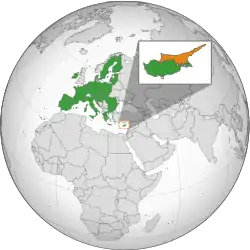
Officially, the island nation of Cyprus is part of the European Union, under the de jure sovereignty of the Republic of Cyprus. Turkish Cypriots are citizens of the Republic of Cyprus and thus of the European Union, and were entitled to vote in the 2004 European Parliament election (though only a few hundred registered). The EU's acquis communautaire is suspended indefinitely in the northern third of the island, which has remained outside the control of the Republic of Cyprus since the Turkish invasion of 1974. The Greek Cypriot community rejected the Annan Plan for the settlement of the Cyprus dispute in a referendum on 24 April 2004. Had the referendum been in favour of the settlement proposal, the island (excluding the British Sovereign Base Areas) would have joined the European Union as the United Cyprus Republic. The European Union's relations with the Turkish Cypriot Community are handled by the European Commission's Directorate-General for Enlargement.[165]
Ireland
The European Council has recognized that following the UK withdrawal from the EU, if Northern Ireland were to be incorporated into the Republic of Ireland to form a united Ireland it would automatically rejoin the EU under Ireland's membership. This is consistent with the incorporation of East Germany into the Federal Republic of Germany as a single European Communities member state.[166][167] It has also been proposed that an independent Scotland could automatically rejoin the EU by forming a union with the Republic of Ireland.[168]
Romania
A similar scenario has been envisioned with the unification of Romania and Moldova, which would incorporate the current territory of Moldova into Romania and thus into the EU.[169]
Special territories of member states
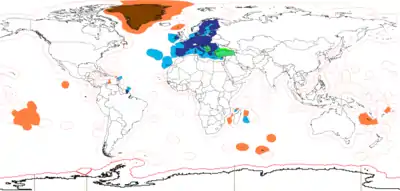
There are multiple special member state territories, some of them are not fully covered by the EU treaties and apply EU law only partially, if at all. It is possible for a dependency to change its status regarding the EU or some particular treaty or law provision. The territory may change its status from participation to leaving or from being outside to joining.
Danish self-governing territories
The Faroe Islands, a self-governing nation within the Kingdom of Denmark, is not part of the EU, as explicitly asserted by both Rome treaties.[170] The relations with the EU are governed by a Fisheries Agreement (1977) and a Free Trade Agreement (1991, revised 1998). The main reason for remaining outside the EU is disagreements about the Common Fisheries Policy,[171] which disfavours countries with large fish resources. Also, every member has to pay for the Common Agricultural Policy, which favours countries having much agriculture which the Faroe Islands does not. When Iceland was in membership negotiations around 2010, there was a hope of better conditions for fish-rich countries, but this came to nothing. The Common Fisheries Policy was introduced in 1970 for the very reason of getting access for the first EC members into waters of candidate countries, UK, Ireland and Denmark with the Faroe Islands.
Nevertheless, there are politicians, mainly in the right-wing Union Party (Sambandsflokkurin), led by their chairman Kaj Leo Johannesen, who would like to see the Faroes as a member of the EU. However, the chairman of the left-wing Republic (Tjóðveldi), Høgni Hoydal, has expressed concerns that if the Faroes were to join the EU as is, they might vanish inside the EU, comparing this with the situation of the Shetland Islands and Åland today, and wants the local government to solve the political situation between the Faroes and Denmark first.[172]
Greenland, a self-governing community that is part of the Kingdom of Denmark, entered the EC with Denmark in 1973, because it was not autonomous at that time. After the establishment of Greenland's home rule in 1979 (effective from 1980), it held a second referendum on membership. The result was (mainly because of the Common Fisheries Policy) to leave, so on 1 February 1985, Greenland left the EEC and EURATOM. Its status was changed to that of an Overseas Country.[173][174] Danish nationals residing in Greenland (i.e. all native population) are nonetheless fully European citizens; they are not, however, entitled to vote in European elections.
There has been some speculation as to whether Greenland may consider rejoining the European Union. On 4 January 2007 the Danish daily Jyllands-Posten quoted the former Danish minister for Greenland, Tom Høyem, as saying "I would not be surprised if Greenland again becomes a member of the EU... The EU needs the Arctic window and Greenland cannot alone manage the gigantic Arctic possibilities".[175] Greenland has a lot of natural resources, and Greenland has, especially during the 2000s commodities boom, contracted private companies to exploit some of them, but the cost is considered too high, as Greenland is remote and severely lacks infrastructure. After 2013 prices have declined so such efforts have stalled.
The Brexit debate has reignited talk about the EU in Greenland with calls for the island to join the Union again.[176]
Dutch constituent countries and special municipalities
The islands of Aruba, Curaçao, and Sint Maarten are constituent countries of the Kingdom of the Netherlands, while Bonaire, Sint Eustatius and Saba are special Dutch municipalities. All are Overseas Countries and Territories (OCT) under Annex II of the EC treaty.[173] OCTs are considered to be "associated" with the EU and apply some portions of EU law. The islands are opting to become an Outermost Region (OMR) of the EU, a status in which the islands form a part of the European Union, though they benefit from derogations (exceptions) from some EU laws due to their geographical remoteness from mainland Europe. The islands are focusing on gaining the same status as the Azores, Madeira, the Canary Islands and the French overseas departments.
When Bonaire, Sint Eustatius, and Saba were established as Dutch public bodies after the dissolution of the Netherlands Antilles (which was an OCT) in 2010, their status within the EU was raised. Rather than change their status from an OCT to an outermost region, as their change in status within the Netherlands would imply, it was decided that their status would remain the same for at least five years. After those five years, their status would be reviewed.
If it was decided that one or all of the islands wish to integrate more with the EU then the Treaty of Lisbon provides for that following a unanimous decision from the European Council.[177] Former European Commissioner for Enlargement Danuta Hübner has said before the European Parliament that she does not expect many problems to occur with such a status change, as the population of the islands is only a few thousand people.
French overseas departments and territories
The territories of French Guiana, Guadeloupe, Martinique, Mayotte and Réunion are overseas departments of France and at the same time mono-departmental overseas regions. According to the EC treaty (article 299 2), all of these departments are outermost regions (OMR) of the EU—hence provisions of the EC treaty apply there while derogations are allowed. The status of the Overseas collectivity of Saint-Martin is also defined as OMR by the Treaty of Lisbon. New Caledonia and the overseas collectivities of French Polynesia, Saint-Barthelemy, Saint Pierre and Miquelon as well as Wallis and Futuna are Overseas Countries and Territories of the EU.[173]
New Caledonia is an overseas territory of France with its own unique status under the French Constitution, which is distinct from that of overseas departments and collectivities. It is defined as an "overseas country" under the 1998 Nouméa Accord, and enjoys a high degree of self-government.[178] Currently, in regard to the EU, it is one of the Overseas Countries and Territories (OCT).
As a result of the Nouméa Accord, New Caledonians voted on an independence referendum in November 2018. This referendum was to determine whether the territory would remain a part of the French Republic as a "sui generis collectivity", or whether it would become an independent state. The accords also specify a gradual devolution of powers to the local New Caledonian assembly. The referendum's result was that New Caledonia would remain a part of the French Republic.
See also
- European integration
- Treaty of Accession 2011
- Withdrawal from the European Union
- Instrument for Pre-Accession Assistance, a funding mechanism for EU candidate countries
References
- "EU candidate status for Albania and North Macedonia". European Commission. 25 March 2020. Retrieved 25 March 2020.
- Kosovo is the subject of a territorial dispute between the Republic of Kosovo and the Republic of Serbia. The Republic of Kosovo unilaterally declared independence on 17 February 2008. Serbia continues to claim it as part of its own sovereign territory. The two governments began to normalise relations in 2013, as part of the 2013 Brussels Agreement. Kosovo is currently recognized as an independent state by 98 out of the 193 United Nations member states. In total, 113 UN member states recognized Kosovo at some point, of which 15 later withdrew their recognition.
- "EU advances membership talks for Montenegro, Serbia". Euractiv. 11 December 2017. Retrieved 24 August 2019.
- Emmott, Robin (2 May 2017). "Turkey's EU dream is over, for now, top official says". Reuters. Retrieved 21 November 2019.
- "Legal questions of enlargement". Enlargement of the European Union. The European Parliament. 19 May 1998. Archived from the original on 21 March 2006. Retrieved 9 July 2008.
- Current Article 1 of the Treaty on European Union reads: "The Union shall be founded on the present Treaty and on the Treaty on the Functioning of the European Union. Those two Treaties shall have the same legal value. The Union shall replace and succeed the European Community".
- Balmforth, Richard; Zinets, Natalia (25 September 2014). "Ukraine president sets 2020 as EU target date, defends peace plan". Reuters. Archived from the original on 15 July 2019. Retrieved 27 December 2020.
- "European Parliament resolution of 17 July 2014 on Ukraine (2014/2717(RSP))". European Parliament. 17 July 2014. Retrieved 20 July 2015.
pursuant to Article 49 of the Treaty on European Union, Georgia, Moldova and Ukraine – like any other European state - have a European perspective and may apply to become members of the Union provided that they adhere to the principles of democracy, respect fundamental freedoms and human and minority rights and ensure the rule of law;
- ""Turkey is no longer an EU candidate", MEP says". Euronews. 10 April 2017. Retrieved 15 April 2017.
- "Euractiv.com". Euractiv.com. Archived from the original on 6 July 2008. Retrieved 7 January 2011.
- "Potential candidates". European Union. Archived from the original on 28 October 2011.
- "2005 enlargement strategy paper". European Union. 9 November 2005. Retrieved 20 November 2019.
- "EU enlargement chief vows to press ahead, for 'stability'". International Herald Tribune. 1 February 2006.
- "European Union, Community Law And International Business Law" (PDF). European Center for Peace and Development. p. 46. Retrieved 20 November 2019.
- "After Years Of Delay, North Macedonia, Albania Get OK To Begin EU Accession Talks". RadioFreeEurope/RadioLiberty. Retrieved 28 March 2020.
- Rankin, Jennifer (6 February 2018). "Serbia and Montenegro could join EU in 2025, says Brussels". The Guardian. Retrieved 20 November 2019.
- Staff (27 March 2020). "EU leaders give final OK to begin Albania, North Macedonia accession talks". RadioFreeEurope/RadioLiberty. Retrieved 8 July 2020.
- "Bulgaria Blocks North Macedonia's EU Accession Negotiations - Novinite.com - Sofia News Agency". novinite.com.
- Official Journal of the European Communities 1973, C113 p2
- Bhalla, Reva; Goodrich, Lauren; Zeihan, Peter (17 March 2009). "Turkey and Russia on the Rise". Stratfor. Archived from the original on 23 August 2011.
- Friedman, George (31 July 2007). "The Geopolitics of Turkey". Stratfor. Archived from the original on 10 October 2009.
- Ekman, Ivar (11 December 2006). "Top Swedish official backs Turkey for EU". International Herald Tribune. Retrieved 3 July 2007.
- "BBC: EU hails Turkey free speech move". BBC News. 30 April 2008. Retrieved 7 January 2011.
- "The ins and outs: The EU's most effective foreign-policy instrument has been enlargement. But how far can it go?". The Economist. 17 March 2007. Retrieved 18 May 2020.
- "Turkey's bid to join the EU is a bad joke; but don't kill it". The Economist. 13 October 2016.
- "EU-Turkey Relations Reaching a Crossroads". Carnegie. 11 April 2017.
- "P8_TA(2016)0450". European Parliament. 24 November 2017. Retrieved 11 November 2017.
- "Freeze EU accession talks with Turkey until it halts repression, urge MEPs". European Parliament.
- Weise, Zia (24 November 2016). "EU parliament votes overwhelmingly in favour of scrapping Turkey accession talks". The Telegraph. Retrieved 21 November 2019.
- Kempf, Danny (13 December 2016). "EU says won't expand Turkey membership talks". Yahoo. Agence France-Presse. Retrieved 21 November 2019.
- Pierini, Marc (12 December 2016). "Turkey's Impending Estrangement From the West". Carnegie Europe. Retrieved 21 November 2019.
- ""Turkey is no longer an EU candidate", MEP says". EuroNews. 10 April 2017. Retrieved 21 November 2019.
- Gonen, Emre (2 May 2017). "A truce with the EU?". Daily Sabah - EuroNews. Retrieved 21 November 2019.
- "Current negotiations status". European Commission. 24 January 2016. Retrieved 26 July 2016.
- "Enlargement and Stabilisation and Association Process - the Republic of North Macedonia and the Republic of Albania - Council conclusions". Council of the European Union. 25 March 2020. Retrieved 29 March 2020.
- "Joint statement of the Members of the European Council" (PDF). European Council. 26 March 2020. Retrieved 29 March 2020.
- The race for EU membership, Politico Europe 15 December 2016
- "European Commission - Statement". European Commission. 15 February 2016. Retrieved 15 February 2016.
- "Information relating to the entry into force of the Stabilisation and Association Agreement between the European Union and the European Atomic Energy Community, of the one part, and Kosovo, of the other part". EUR-Lex. 24 March 2016. Retrieved 24 March 2016.
- "Montenegro 2019 Report" (PDF). European Commission. 29 May 2019. Retrieved 21 November 2019.
- "Serbia starts negotiations to join EU". B92. 21 January 2014. Retrieved 21 January 2014.
- "New clashes likely between Turkey, Europe". Al-Monitor. 23 June 2017.
- "EU freezes talks on Turkey membership". 12 December 2006. Retrieved 5 September 2017.
- Michael, Peter (26 June 2018). "EU Council issues strong message about Turkey's obligations". Retrieved 21 November 2019.
- "Enlargement - Check current status". European Commission. Retrieved 27 June 2014.
- "Republic of Turkey Ministry for EU Affairs". Archived from the original on 17 August 2007. Retrieved 19 February 2019.
- "Secretariat for European Affairs". sep.gov.mk.
- "Montenegro Ministry of Foreign Affairs and European Integration".
- "Government of the Republic of Serbia European Integration Office". Archived from the original on 17 February 2018. Retrieved 19 February 2019.
- "Republic of Albania Ministry of Integration". Archived from the original on 15 March 2010. Retrieved 19 February 2019.
- "Directorate for European Integration". dei.gov.ba.
- Europian, Ministria e Integrimit. "Ministria e Integrimit Europian". Ministria e Integrimit Europian.
- "EU, Montenegro complete negotiations on pre-membership deal to bring country closer to bloc". International Herald Tribune. The Associated Press. 1 December 2006. Archived from the original on 25 September 2008. Retrieved 4 April 2011.
- "Kosovo Launches Crucial SAA Talks With EU". Balkan Insight. 28 October 2013. Retrieved 28 October 2013.
- "Stabilisation and Association Agreement between the European Union and Kosovo signed" (Press release). European Commission. 26 October 2015. Retrieved 21 November 2019.
- "EUR-Lex - 21996D0213(01) - EN". Eur-lex.europa.eu. Retrieved 16 September 2013.
- "SAA Agreement with Bosnia". Council of the European Union. Retrieved 20 April 2010.
- "Information relating to the entry into force of the Stabilisation and Association Agreement between the European Union and the European Atomic Energy Community, of the one part, and Kosovo, of the other part". EUR-Lex. 24 March 2016. Retrieved 24 March 2016.
- "Bosnia and Herzegovina applied for EU membership today". The Netherlands EU Presidency 2016. 15 February 2016. Retrieved 15 February 2016.
- "Serbia Moves Closer to Joining E.U." nytimes.com. Retrieved 16 September 2013.
- "Council conclusions on the application of Bosnia and Herzegovina for membership of the EU". Council of the European Union. Retrieved 20 September 2016.
- "Hahn: Questionnaire is a game changer for future of BiH". Delegation of the European Union to Bosnia and Herzegovina. Retrieved 9 December 2016.
- "Albania: EU Commission OKs status of membership candidate". ansamed.info. Retrieved 16 October 2013.
- "Montenegro is officially awarded EU candidate status". euobserver.com. Retrieved 16 September 2013.
- "EU candidate status for Albania". European Commission. 23 June 2014. Retrieved 21 November 2019.
- "European Council - 26/27 June 2014 - Conclusions" (PDF). European Council. 27 June 2014. Retrieved 21 November 2019.
- Pawlak, Justyna. "EU opens to Serbia after Kosovo deal | Reuters". Uk.reuters.com. Retrieved 16 September 2013.
- "Communication from the Commission to the European Parliament, The Council, The European Economic and Social Committee and the Committee of the Regions" (PDF). europa.eu. 9 November 2016. Retrieved 9 November 2016.
- "Council conclusions on enlargement and stabilisation and association process - Consilium". consilium.europa.eu.
- "Council conclusions on Montenegro" (PDF). ue.eu.in. Archived from the original (PDF) on 19 June 2013. Retrieved 16 September 2013.
- "Council conclusions on Enlargement and Stabilisation and Association Process" (PDF). Council of the European Union. 17 December 2013. Retrieved 17 December 2013.
- "European Council conclusions, 28 June 2018". European Council. 28 June 2018. Retrieved 29 March 2020.
- "Enlargement and Stabilisation and Association Process - Council conclusions" (PDF). European Council. 26 June 2018. Retrieved 29 March 2020.
- "Serbia starts negotiations to join EU". B92. 21 January 2014. Retrieved 21 January 2014.
- "Conditions for membership". European Commission. Retrieved 21 December 2014.
- "Georgia can apply for EU membership if it complies with democratic principles". Trend.Az. 18 April 2014.
- < EU-Ukraine Deep and Comprehensive Free Trade Area. trade.ec.europa.eu.
- Rettman, Andrew (22 October 2010). "EU unlikely to expand into post-Soviet east in next decade". Euobserver.com. Retrieved 7 January 2011.
- Makszimov, Vlagyiszlav (22 January 2021). "Georgian president visits Brussels in push for 2024 EU membership application". www.euractiv.com. Retrieved 24 January 2021.
- "Georgia-EU Relations Within Georgia's 2024 Objective to Apply for the EU Membership". GeorgianJournal (in Georgian). Retrieved 24 January 2021.
- "Armenia-EU finalize new deal". Asbarez. Asbarez News Agency. 3 October 2018. Retrieved 3 October 2018.
- "Օր առաջ դուրս գալ ԵԱՏՄ-ից. "Հայաստանի Եվրոպական կուսակցությունը" համագումար է..." A1Plus.
- "About Us". Heritage Party Website. Archived from the original on 30 May 2014.
- Shahunyan, Tatevik (26 September 2005). "Interview With RA National Assembly Speaker Artur Baghdasaryan". ARMINFO. Archived from the original on 7 June 2007. Retrieved 21 November 2019.,
- "People's Party of Armenia Changes Orientation". Armenpress. 8 December 2006. Retrieved 21 November 2019.
- Union for National Self-Determination Party. "The views of Armenian and Azerbaijani Political Parties on the Nagorno-Karabakh conflict and conflict resolution process" (PDF). Commonspace EU. Retrieved 21 November 2019.
- Kucera, Joshua (26 April 2018). "Armenia's "Velvet Revolution" keeps peace with Russia - for now". Eurasianet. Retrieved 21 November 2019.
- Danielyan, Emil (18 October 2019). "Tsarukian Endorsed By Eurosceptic EU Politicians". azatutyun.am. RFE/RL.
- "EUSUPP: Support of country's membership in EU (%)". caucasusbarometer.org. Caucasus Research Resource Centers. 15 March 2020. Archived from the original on 14 August 2020.
- "Do Belarusians Want to Join the EU?". IISEPS. Belarus Digest. 12 April 2013. Retrieved 10 August 2020.
- "Georgia-EU association agreement initialled". Trend.Az. 29 November 2013.
- "Georgia can be full EU member in 5-10 years". Trend.Az. 28 June 2014.
- "Russia's opposition to Georgia's EU integration". Worldview.stratfor.com. 6 December 2013. Retrieved 20 September 2018.
- "NDI Poll: EU, NATO support at a 5-year high in Georgia". Retrieved 2 February 2019.
- Ingebritsen, Christine (1998). The Nordic States and European Unity. Cornell University Press.
- "Two-thirds reject EU membership". Retrieved 8 February 2018.
- "Moldova will prove that it can and has chances to become EU member", Moldpress News Agency, 19 June 2007
- Phinnemore, David (21–23 September 2006). "Moldova: a step too far for EU enlargement?" (PDF). 3rd Pan-European Conference on EU Politics, Istanbul, Turkey. Johns Hopkins University. Archived from the original (PDF) on 17 July 2011. Retrieved 1 August 2010.
- Klussmann, Uwe (4 February 2009). "Reunification with Romania? EU Dreams in Communist Moldova". Der Spiegel. Retrieved 1 August 2010.
- Konstanyan, Hrant (3 March 2016). "Why Moldova's European integration is failing". CEPS. Centre for European Policy Studies. Retrieved 23 July 2020.
- "Moldova wants to join EU in 2019". The Straits Times. 29 April 2014. Retrieved 14 May 2014.
- "President of Moldova says his country cannot join EU in current form". 2 June 2017 – via www.reuters.com.
- "Uniunea Europeană vs. Uniunea Euroasiatică: Ce aleg cetățenii RM // SONDAJ". JurnalTV.md (in Romanian). 2 July 2020. Retrieved 27 December 2020.
- Bergsaker, Tore (27 August 2016). "Brexit rokker ikke norsk EU-motstand" (in Norwegian). Dagbladet. Retrieved 21 November 2019.
- "EU Relations with the Principality of Andorra, the Principality of Monaco and the Republic of San Marino: Options for their participation in the Internal Market". European Commission. 18 November 2013. Retrieved 20 November 2013.
- "Referendum "europeo": Sinistra Unita dice "Sì"". SMtv San Marino. 9 September 2013. Retrieved 15 September 2013.
- "Referendum Ue: sì convinto dall'Upr". SMtv San Marino. 6 September 2013. Retrieved 15 September 2013.
- "Civico 10. Su Europa e referendum". 26 September 2013. Archived from the original on 27 September 2013. Retrieved 26 September 2013.
- "Civico10 sul referendum sull'Europa: vietato votare 'no'". 5 September 2013. Archived from the original on 11 September 2013. Retrieved 15 September 2013.
- "Congresso Psd: si cerca la mediazione su un nome che rappresenti le diverse anime". SMtv San Marino. 19 September 2013. Retrieved 26 September 2013.
- "Referendum Europa: il Ps è per il sì". SMtv San Marino. 10 September 2013. Retrieved 15 September 2013.
- "Referendum 2013: Per San Marino invita a votare sì". SMtv San Marino. 6 October 2013. Retrieved 8 October 2013.
- "Referendum sull'Europa, Psm spinge verso "l'inizio di una trattativa lunga e difficile"". 5 September 2013. Retrieved 15 September 2013.
- "DC, maggiore integrazione all'Europa non significa adesione". SMtv San Marino. 20 September 2013. Retrieved 26 September 2013.
- "San Marino rejects EU accession". Politico Europe. 23 October 2013.
- "Linke lanciert neue EU-Beitrittsdebatte" (in German). baz.online. 8 February 2009. Retrieved 9 February 2009.
- Kuenzi, Renat (15 May 2014). "'We're Not the Only EU Sceptics'". Swissinfo. Retrieved 21 November 2019.
- "Über Uns". Campaign for an Independent and Neutral Switzerland official website. Retrieved 4 April 2016.
- "Swiss say 'no' to EU". BBC News. 4 March 2001. Retrieved 5 May 2008.
- "EU accession and the Ukraine crisis". openDemocracy.
- "EUobserver article". 24 May 2005. Archived from the original on 24 May 2005.
- "Ukraine ratifies EU association agreement". Deutsche Welle. 16 September 2014. Retrieved 27 December 2020.
- "Volodymyr Zelenskyy: Ukraine continues to move towards deepening integration with the European Union". Official website of the President of Ukraine. Retrieved 31 May 2019.
- "Almost 70% of Ukrainians would support at referendum Ukraine's accession to EU - poll". Interfax-Ukraine. 14 June 2019.
- Cooper, Charlie (31 August 2020). "British parties give up Brexit fight". POLITICO. Retrieved 2 September 2020.
- Mason, Rowena (14 March 2016). "Green party 'loud and proud' about backing Britain in Europe". The Guardian. Retrieved 29 September 2017.
- Greer, Ross (22 February 2016). "Now is the time to fight to stay in Europe ... and to reform it from the left, not the right as Cameron plans". Green Party of Scotland. Retrieved 29 September 2017.
- "Green Party Manifesto (2017, Westminster)" (PDF). Green Party of Northern Ireland. Archived from the original (PDF) on 27 August 2018. Retrieved 7 October 2017.
- Carrell, Severin (3 March 2016). "Scotland to campaign officially to remain in the EU". The Guardian. Retrieved 29 September 2017.
- McDonnell, Alasdair (10 June 2016). "McDonnell Brexit Address". Social Democratic and Labour Party (SDLP). Retrieved 29 September 2017.
- Hughes, Brendan (22 February 2016). "EU referendum: Where Northern Ireland parties stand". The Irish News. Retrieved 7 October 2017.
- "Stay in EU to solve its problems, Plaid Cymru says". BBC News. 10 February 2016. Retrieved 29 September 2017.
- "Brexit Section". Plaid Cymru / Party of Wales. Retrieved 29 September 2017.
- Walker, Sophie (26 July 2018). "Overconfident men brought us Brexit. It's not too late for women to fix it". The Guardian. Opinion. Retrieved 24 August 2018.
- "What we believe". UK European People's Party. Retrieved 7 October 2017.
- "International". Left Unity. Retrieved 7 October 2017.
- MacAskill, Andrew. "New British party inspired by Macron seeks to overturn Brexit". reuters.com. Retrieved 20 February 2018.
- "The Internal Enlargement of the European Union". Centre Maurits Coppieters. 22 June 2017.
- The ‘internal’ enlargement of the European Union – is it possible?, Oxford University Press 1 May 2014
- THE INTERNAL ENLARGEMENT OF THE EUROPEAN UNION Archived 9 February 2018 at the Wayback Machine Centre Maurits Coppieters 2011
- Edward, David, "Scotland's Position in the European Union", Scottish Parliamentary Review, Vol. I, No. 2 (Jan 2014) [Edinburgh: Blacket Avenue Press]
- "Scottish independence: Irish minister says EU application 'would take time'". BBC. 25 January 2013. Retrieved 2 February 2013.
- Rankin, Jennifer; Carrell, Severin. "Independent Scotland 'would have to apply to join EU' – Brussels official". The Guardian. Retrieved 20 September 2018.
- The Catalan independence movement is pro-EU – but will the EU accept it?, London School of Economics 10/OCT/17
- Independent Catalonia would need to apply to join EU -Juncker, Reuters 14/SEP/17.
- "European Commission - Statement on the events in Catalonia". europa.eu (Press release). Retrieved 9 December 2017.
- Scottish independence: EC's Barroso says new states need 'apply to join EU', BBC News, 10 December 2012
- "correspondence from Mr Barroso to the House of lords" (PDF).
- Holehouse, Matthew (16 February 2014). "Jose Manuel Barroso: nearly impossible for Scotland to join EU". London: Sunday Telegraph. Retrieved 4 September 2014.
Spain, which fears the separation of the Catalonia region, has blocked the accession of Kosovo ... Jose Manuel Barroso, the president of the European Commission ... went on: 'It will be extremely difficult to get the approval of all the other member states to have a new member coming from one member state.' 'We have seen that Spain has been opposing even the recognition of Kosovo, for instance. It’s to some extent a similar case because it’s a new country, and so I believe it’s going to be extremely difficult, if not impossible.'
- Nikolaj, Nielsen (17 September 2013). "EU commission: Catalonia must leave EU if it leaves Spain". EUObserver.com. Retrieved 19 September 2013.
- Johnson, Simon (27 November 2013). "Spanish PM: Independent Scotland would be kicked out of the EU". The Daily Telegraph. London.
- "Scottish independence: Spain warning over EU entry". Edinburgh: The Scotsman. 3 February 2014. Retrieved 20 November 2019.
'They have to resolve a mountain of problems, as Better Together has explained very well,' he said.'You have to achieve candidate status. You have to negotiate 35 chapters . It has to be ratified by the institutions of the EU. It then has to be ratified by 28 national parliaments.'
- Murray, Graeme (26 February 2012). "Spain will not veto an independent Scotland joining EU". London: Sunday Express. Retrieved 4 September 2014.
- Crawford, James; Boyle, Alan (10 December 2012). "Annex A - Opinion: Referendumon the Independence of Scotland – International Law Aspects" (PDF). p. 67. Retrieved 19 February 2013.
Part I: Executive summary ... 6.1 Since the rUK would be the same state as the UK, its EU membership would continue. Indeed, the EU treaties implicitly preclude ‘automatic’ withdrawal by a state. There might have to be an adjustment to the UK’s terms of membership to reflect its reduction in territory and population, but this could be done without the UK ceasing to be an EU Member State.
- Crawford, James; Boyle, Alan (10 December 2012). "Annex A - Opinion: Referendum on the Independence of Scotland – International Law Aspects" (PDF). p. 67. Retrieved 19 February 2013.
Part I: Executive summary ...6. Within the EU, there is no precedent for what happens when a metropolitan part of a current Member State becomes independent, so it is necessary to speculate. ... 6.2 On the face of it, if Scotland had voted for independence it would have been required to accede to the EU as a new state, which would require negotiations on the terms of its membership, including on the subjects of the UK’s current opt-outs. The EU treaties make no provision for succession to membership. Certain provisions of the EU treaties would require amendment. If Scotland were somehow to become an EU member in its own right automatically, it is not clear how adjustments to the relative positions of Member States could be willed into being without negotiations. Nor would it be clear on what terms it would be a member. 6.3 Some have argued that the rights conferred on individuals by EU citizenship might influence the European Court of Justice (ECJ) to somehow resist this outcome. But this is a matter for speculation and does not have a clear precedent in EU law. It would also require the issue to somehow come before the ECJ, which may be unlikely. 7. In any event, Scotland’s position within the EU is likely to be shaped more by any agreements between the parties than by pre-existing principles of EU law.
- "Unionists urged to sign EU letter". Glasgow: The Herald. 31 January 2013. Retrieved 21 November 2019.
- "Scottish Independence: Blair Jenkins answers your questions". BBC. 18 January 2013. Retrieved 5 February 2013.
- Crawford, James; Boyle, Alan (10 December 2012). "Annex A - Opinion: Referendumon the Independence of Scotland – International Law Aspects" (PDF). Retrieved 19 February 2013.
- "Sturgeon: UK 'arrogant' over Scottish independence". BBC. 11 February 2013. Retrieved 19 February 2013.
- "'Better Together' - Alistair Darling delivers the John P Mackintosh lecture". 10 November 2012. Archived from the original on 14 October 2013. Retrieved 5 February 2013.
- Richard, Youngs (11 July 2017). "EU needs a smarter response to the Catalonia crisis". Politico. Retrieved 21 November 2019.
- Teffer, Peter (22 December 2017). "Separatist 'win' does not change EU view on Catalonia". EU Observer. Retrieved 21 November 2019.
- Van Parijs, Philippe (4 October 2007). "Brussels after Belgium: fringe town or city state ?" (PDF). The Bulletin. Retrieved 29 November 2007.
- Feki, Donya (29 November 2007). "Jean Quatremer: a nation has been born—Flanders". Café Babel. Archived from the original on 9 March 2010. Retrieved 29 November 2007.
- "Turkish Cypriot community". European Commission — Directorate-General for Enlargement. 3 January 2007. Archived from the original on 10 December 2010.
- "Outcome of the special European Council (Article 50) meeting of 29 April 2017" (PDF). European Parliament. 1 May 2017. Retrieved 26 December 2017.
- Rankin, Jennifer (28 April 2017). "Europe could allow a united Ireland to join EU after Brexit". The Guardian. Retrieved 23 July 2020.
- "Does Robert The Bruce offer a 700 year old solution to Brexit impasse?". Trinity College Dublin. 30 November 2018. Retrieved 14 October 2020.
- A union between Moldova and Romania: On the cards?, EUObserver 5 March 2015
- "Treaty establishing the European community, last revision from Nice 2001, Art.299(6)a". Eur-lex.europa.eu. 1 January 2004. Retrieved 7 January 2011.
- Spongenberg, Helena (4 May 2006). "Fish keep Faroe Islands at a distance from EU". EUobserver.com. Retrieved 21 November 2019.
- "Portal.fo" (in Faroese). Retrieved 7 January 2011.
- "Greenland's exit warning to Britain". Polotico.eu. 22 June 2016.
- "Legislation (Greenland)". Official Journal of the European Communities. 28. 1 February 1985. Retrieved 27 December 2020.
- "Greenland could re-join the EU". EUobserver Review. 5 January 2007. Archived from the original on 20 January 2008. Retrieved 25 June 2007.
- Baume, Maïa de La (22 June 2016). "Greenland's exit warning to Britain". POLITICO.
- "Treaty of Lisbon Article 2, point 293" (PDF).
- "Countries - Pacific - New Caledonia - Information Paper - NZ Ministry of Foreign Affairs and Trade". Mfat.govt.nz. Archived from the original on 28 January 2013. Retrieved 9 December 2013.
External links
| Wikimedia Commons has media related to Enlargement of the European Union. |
- Official website

- Enlargement – Europa (web portal)
- European Union Member States and applicant countries – European NAvigator
- Bahhouth, Victor; Ziemnowicz, Christopher (6 March 2018). "Meeting the Global Challenges of Doing Business in the Five Candidate Countries on the Road to Join the European Union". Journal of the Knowledge Economy. 10 (3): 1297–1318. doi:10.1007/s13132-018-0531-3. S2CID 158074120.
- War crimes, conditionality and EU integration in the Western Balkans, by Vojin Dimitrijevic, Florence Hartmann, Dejan Jovic, Tija Memisevic, edited by Judy Batt, Jelena Obradović, Chaillot Paper No. 116, June 2009, European Union Institute for Security Studies
